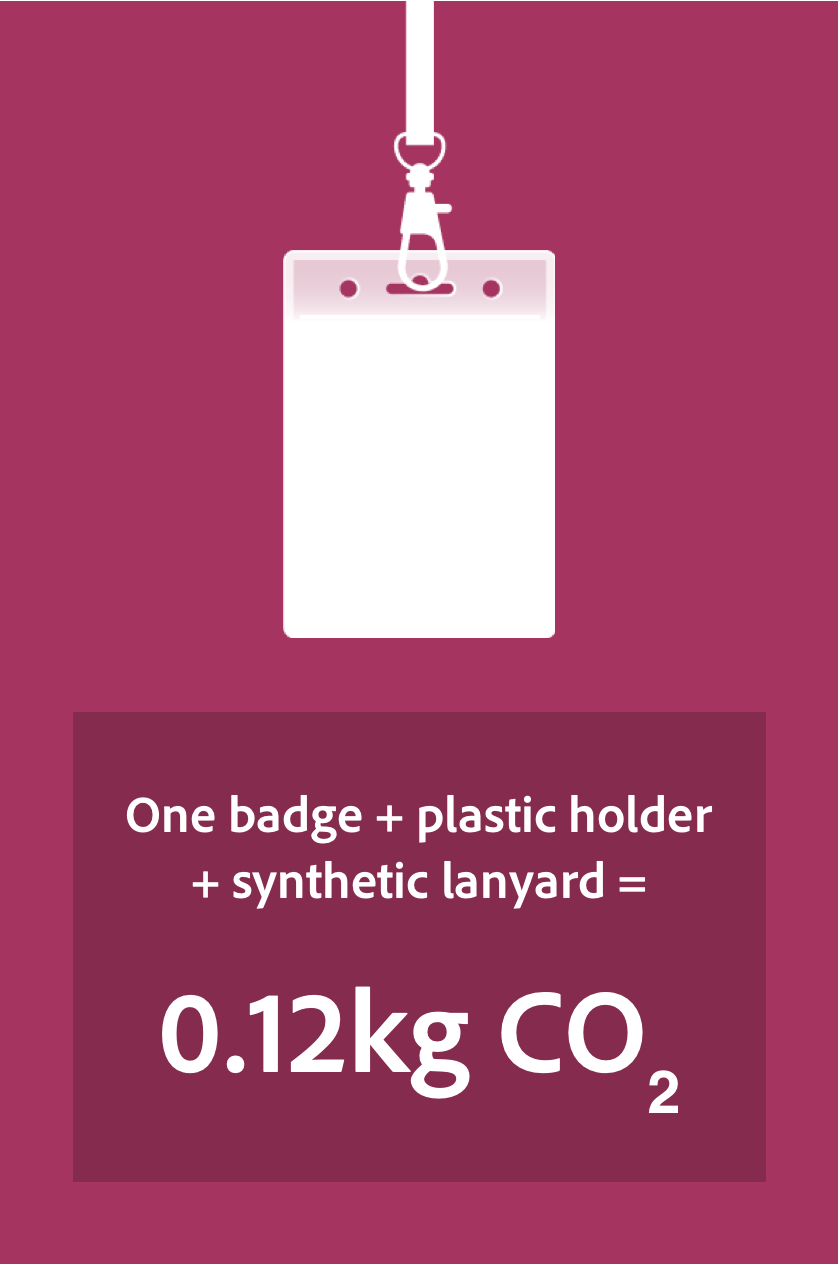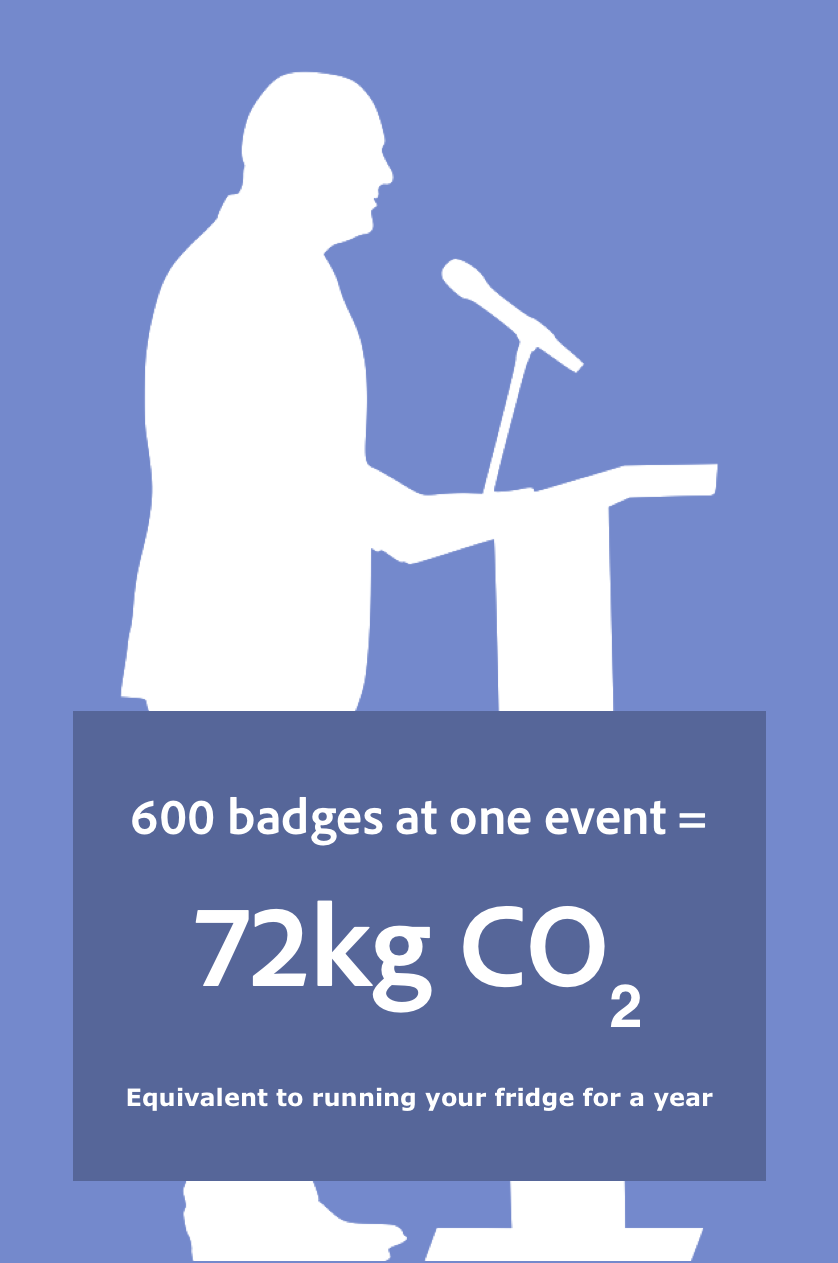
The Impact of Conference Name Tags … and What to Do About It
Most get binned. Ours leave no trace.
The Environmental Impact of Plastic Name Badges
Every event leaves a footprint. The question is, how big? Traditional plastic name badge sets might seem small, but across 484,000+ events, the carbon footprint of name tags adds up fast.
At Terra Tag, we’ve flipped the script. Our sustainable name tags & biodegradable lanyards return to the earth (literally — some grow wildflowers). We also support low-waste DIY printing. So, your event can stand out without leaving a mess behind.
One Badge. One Holder. One Lanyard. What’s It Really Costing the Planet?
Small Switch. Big Impact.
Plastic badge sets might seem insignificant, but when you multiply their footprint across hundreds of guests & thousands of events, the impact is massive. We offer sustainable name tag solutions that are compostable, recyclable & customisable without the plastic, prep, or guilt.
LET’S RETHINK WHAT HANGS AROUND YOUR GUESTS’ NECK
Note: CO₂ emissions calculated based on the production phase of plastic materials. End-of-life impacts, such as incineration or landfill degradation not included. Source: www.homeaffairs.gov.au
Real Events. Real Emissions Saved
This is the eco friendly event badges impact your team can make by switching from plastic.
600 badges
72kg CO₂ saved
Made from recycled street directories
Guests loved the plantable twist
That’s like running 1,000 loads of laundry
500 badges
60kg CO₂ saved
Made from ‘Forget-Me-Not’ seed paper
Met sustainability goals
That’s like streaming 2,500 hours of video
450 badges
54 kg CO₂ saved
Made from recycled paper in full-colour
Paired with red biodegradable lanyards
That’s like charging 6,750 smartphones
The Best Alternatives to Plastic Name Badges
Whether you’re looking to reduce plastic, cut emissions, or choose the best plastic name badge alternatives, here’s how each option stacks up. Compare sustainable name tag materials side-by-side to find the best fit for your event.
-
Pros
Made from 100% post-consumer recycled paper
Recyclable, compostable, and Australian-made
Clear, crisp printing (especially for fine text)
More affordable than seed paper
Cons
Not plantable like seed paper
Requires correct disposal (recycling or compost)
End-of-Life Impact
Can be recycled or composted – no landfill requiredBest For
Events wanting a sustainable, budget-conscious optionVerdict
A smart, eco-friendly alternative that still looks sharp -
Pros
Made from handmade, seed-infused paper
100% biodegradable, compostable, or plantable
Guests can plant their badges post-event
No plastic sleeves or clips needed
Made locally in Queensland
Cons
Slightly higher upfront cost, however probably evens out when considering all the part costs in a traditional event badge
More suited to bold, beautiful artwork due to handmade texture
End-of-Life Impact
Can be planted, composted, or recycled — truly zero wasteBest For
Events looking to align with strong sustainability goals & leave a positive legacyVerdict
The most sustainable & memorable badge on the market -
Pros
Durable & reusable across multiple events
Compostable if untreated
Visually premium – ideal for high-end events
Cons
Requires harvesting new material
Not suited for single-use
Reuse depends on good collection practices
End-of-Life Impact
Compostable, but only if materials are natural & untreatedBest For
Brands seeking a reusable badge with a natural aestheticVerdict
Good for reuse, but not zero-waste or circular -
Pros
Uses recycled plastic (often from water bottles)
Strong, familiar & reusable
Reduces need for virgin plastic
Cons
Still plastic — not biodegradable
Microplastics may shed over time
Needs proper recycling infrastructure
End-of-Life Impact
Technically recyclable, but frequently landfilledBest For
Organisations seeking a more “eco-conscious” plastic optionVerdict
A halfway step — more sustainable than virgin plastic, but still problematic -
Pros
Made from plant-based materials like cornstarch
Looks & feels similar to plastic
Breaks down faster than conventional plastic
Cons
Requires industrial composting to break down
Not suitable for home compost
Produces emissions in production
End-of-Life Impact
Only compostable under very specific conditionsBest For
Organisations with access to industrial composting facilitiesVerdict
Better than plastic, but not truly waste-free -
Pros
Water-resistant, tear-resistant & lightweight
Suitable for outdoor & multi-day events
Cons
Made from synthetic HDPE (a type of plastic)
Difficult to recycle without specialist facilities
Often marketed as eco-friendly & is mistaken for a sustainable material
End-of-Life Impact
Often ends up in landfill despite recyclability claimsBest For
Events where durability is key, but waste may be overlookedVerdict
Low waste in theory, high waste in practice -
Need help deciding between seed paper and recycled paper badges?
Seed Paper (Plantable)
100% biodegradable & compostable
Plantable — grows into flowers, herbs, or natives
Beautiful texture with a handcrafted finish
No landfill or recycling required
Recycled Paper (Sustainable)
Made from 100% post-consumer recycled paper
Fully recyclable & compostable
Ideal for WA, TAS, or venues with strict biosecurity
Still not sure?
Just tell us a bit about your event & we’ll recommend the best fit — sustainability is what we do best.

FAQs About Name Badge Sustainability & Materials
-
A: We use post-consumer recycled paper, handmade right here in our Sunshine Coast studio, paired with soft, biodegradable cotton cords. No plastic. No harsh chemicals. Just beautiful, planet-friendly materials that look polished, feel premium & tread lightly on the Earth.
-
A: Locally & lovingly—from our own Queensland-based team. We make our seed paper using waste paper that would otherwise end up in landfill, giving it a second life as wildflowers, herbs or native grasses. Homegrown sustainability at its finest.
-
A: We call it our rescue mission—because every badge we make saves something from the bin. It starts with us collecting waste paper from local printers, schools & businesses—offcuts & misprints that would normally head to landfill. We tear it by hand, blend it into pulp using upcycled equipment (yes, that’s a former café blender) & form new paper sheets from scratch in our Sunshine Coast studio.
Every step is designed to tread lightly:
We use minimal water—just 20L per batch, often greywater
We skip all harsh chemicals—no bleach, no dyes, no toxins
We dry using solar power & sunshine (not electricity-hungry dryers)
We print using low-heat, water-based inks that are seed-safe and energy-efficient
Even our tools are repurposed: old window screens become paper moulds & our drying racks are made from old timber offcuts. It’s not high-tech—but it’s high-heart. We believe sustainability should show up in the process, not just the product—& with Terra Tag, it does.
-
A: Good news: our cotton cords are 100% biodegradable. You can compost them, reuse them in your next DIY project, or pop them in general waste—either way, they’ll break down naturally. (Bonus points if you give them a second life as gift wrap ties or garden twine.)
-
A: We do—& we actually follow it (not just file it under “nice ideas”). Our eco policy guides every step of our process: from sourcing & printing, to packaging, shipping & waste reduction. You can read the full thing—but the short version? We walk the walk.
-
A: Each Terra Tag includes a QR code on the back that links to clear planting & recycling instructions—so guests know exactly what to do. Whether it’s sowing wildflowers or tossing the badge into the recycling bin, we’ve made it easy to close the loop.
-
A: Everything is packed by hand (with love) using 100% recycled, recyclable & plastic-free materials. Think honeycomb wrap instead of bubble wrap, eco paper tape instead of plastic & boxes we’ve given a second life. It’s low waste, high care, & always planet-forward.
Switch from Wasteful to Wonderful: Sustainable Name Tag Solutions That Actually Work
Ready to reduce the environmental impact of event badges without compromising on quality, style or ease? Whether you're looking for plastic name badge alternatives, DIY options or fully assembled sets, Terra Tag will help.
Join hundreds of Aussie teams already reducing conference badge waste with our planet-friendly materials — from plantable seed paper to 100% recycled paper & biodegradable lanyards. It’s simple, beautiful & good for our planet.






